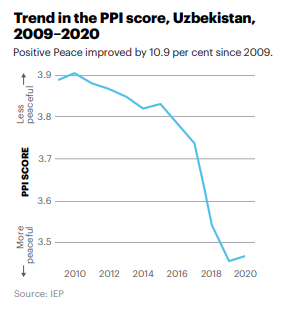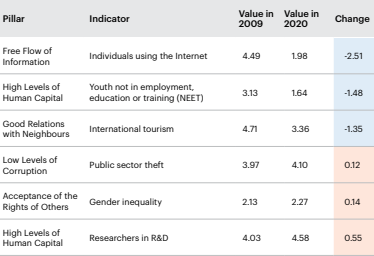Uzbekistan recorded the largest improvement in Positive Peace of all countries assessed over the past decade. The country’s Positive Peace Index improved by 0.422 points from 2009 to 2020, or 10.9 per cent over the period.

Most of the country’s progress in societal resilience took place from 2016 onwards. Around that time, Uzbekistan implemented deep administrative reforms, effectively ending the last remains of post-Soviet isolationism.
The country liberalised the exchange rate regime, began easing visa requirements and announced a series of tax changes aiming to attract international investors. There was also a program for reducing state intervention on the economy and in private affairs.
The country improved in all Domains and Pillars of Positive Peace, with particularly large changes being recorded in Free Flow of Information, Good Relations with Neighbours and Equitable Distribution of Resources. While substantive, these improvements come off a relatively low base, with Uzbekistan still ranking 100th out of the 163 nations assessed in the Positive Peace Index 2022.

There has been some progress in combating corruption, especially with the passing of the “On Anti-Corruption” legal framework. It was put in place in 2003 and has been gradually implemented and enhanced ever since. Despite this, the level of corruption remains high, with the country ranking 139th out of the 163 nations assessed in the Low Levels of Corruption Pillar.
The social, economic and international relations reforms have driven large improvements in the country’s individuals using the Internet, youth not in employment, education and training (NEET) and international tourism indicators. There have also been substantial improvements in the areas of government openness and transparency, regulatory quality and group grievance.
Download the Positive Peace Index 2022 report here.